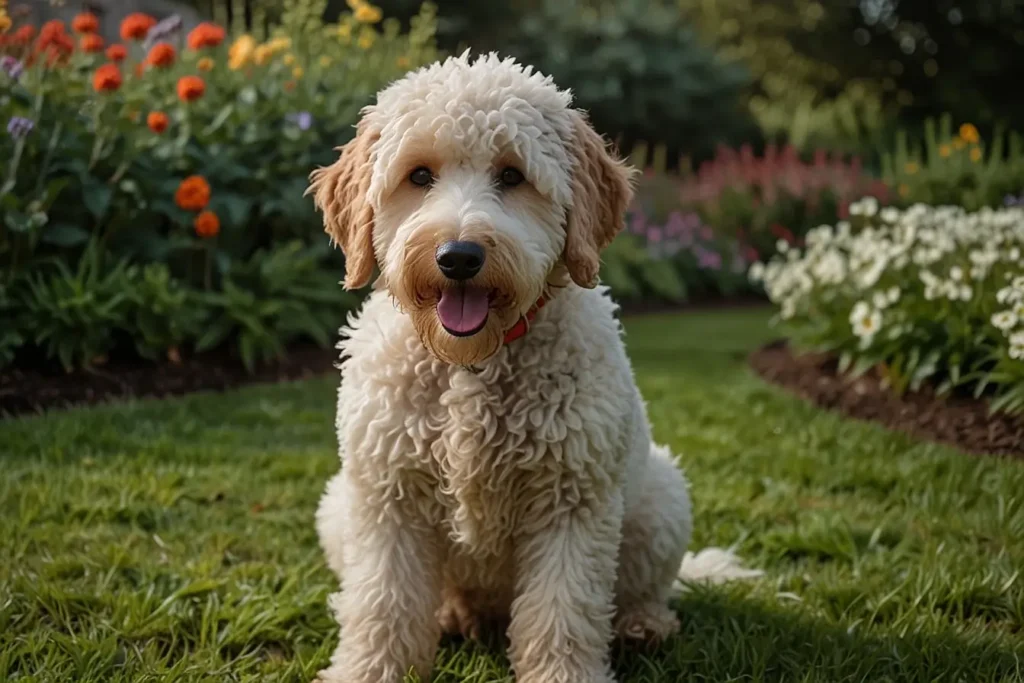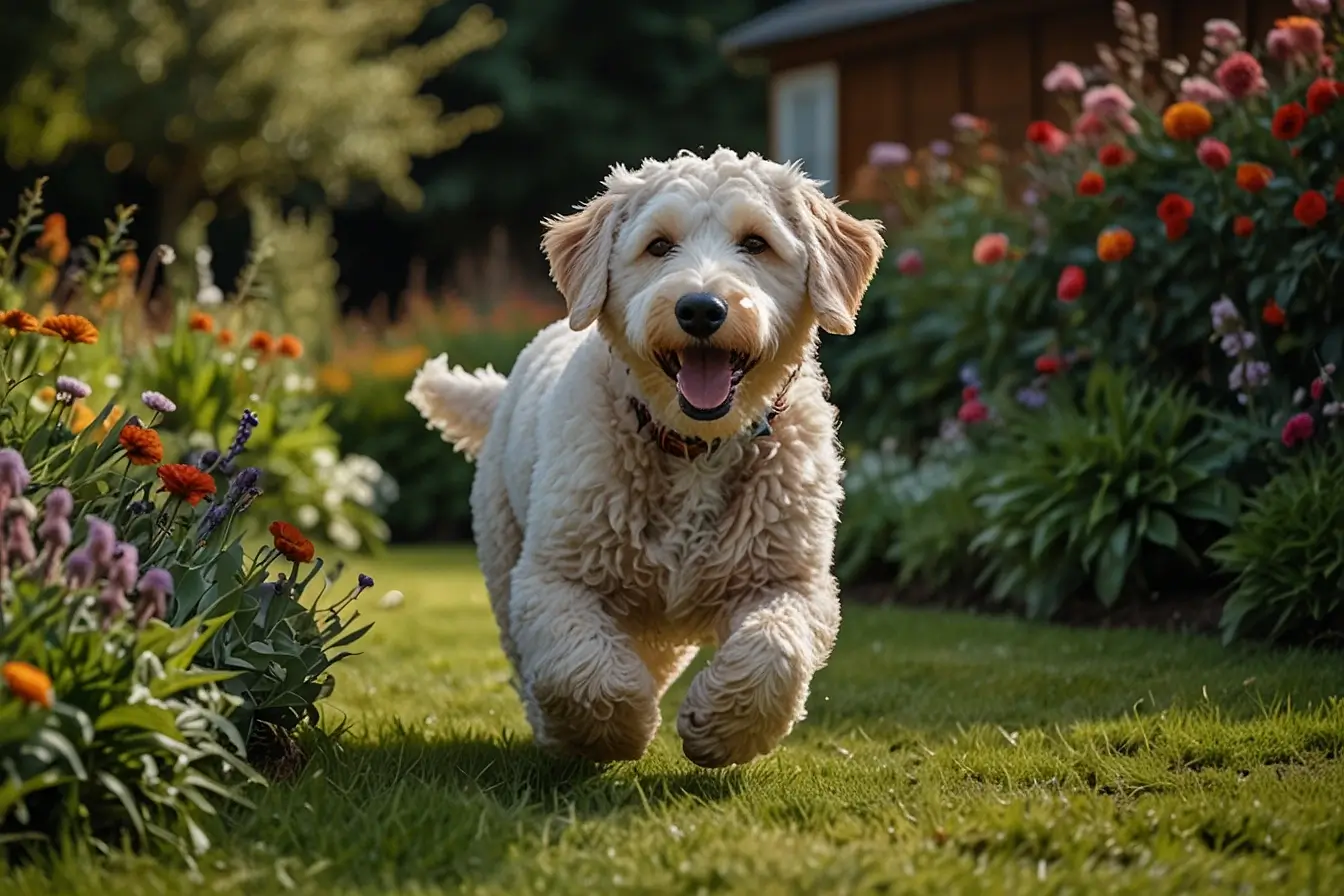Discover the unique traits of an F1 Pyredoodle, a first-generation mix of the Great Pyrenees and Poodle.
The Pyredoodle is a crossbreed between two well-loved dog breeds: the Great Pyrenees and the Poodle. Known for being a gentle giant with a hypoallergenic coat, Pyredoodles have quickly gained popularity as loyal and family-friendly pets.
- F1 Pyredoodle and F1b: What’s the Difference?
- How Big Do Pyredoodles Get?
- The Gorgeous White Coat and Color Variations
- Family-Friendly and Affectionate Nature
- Guardian Instincts and Protective Nature
- Regular Grooming to Prevent Matting
- Low-Shedding and Hypoallergenic Qualities
- Common Health Issues
- Choosing a Health-Tested Breeder
- Early Socialization and Obedience Training
- Preventing Separation Anxiety
- Space Needs for Large Dogs
- Exercise and Mental Stimulation
- Pros of Having a Pyredoodle
- Cons of Having a Pyredoodle
F1 Pyredoodle and F1b: What’s the Difference?
When looking for a Pyredoodle, you may come across terms like “F1” and “F1b.” The F1 Pyredoodle, often considered the first-generation cross, is an even mix of the Great Pyrenees and Poodle.
An F1b Pyredoodle, on the other hand, is back-crossed with a Poodle, making it 75% Poodle and 25% Great Pyrenees. This distinction may influence their coat type, with F1b Pyredoodles often inheriting more of the Poodle’s hypoallergenic, low-shedding traits.

Physical Traits of Pyredoodles: Size, Coat, and Color
How Big Do Pyredoodles Get?
Pyredoodles are generally a large breed, with most F1 Pyredoodle puppies growing into fully grown adults between 80 and 100 pounds. This breed typically reaches its full size by around 18 months, though some can be slightly smaller or larger depending on genetic factors. Mini Pyredoodles are a more recent variation and are bred to be smaller, but they can still weigh around 35-50 pounds when fully grown.
The Gorgeous White Coat and Color Variations
A common trait among Pyredoodles is their thick, gorgeous white coat, although other colors may appear as well, such as cream, apricot, or shades with a mix of both parent breeds. The F1 Pyredoodle is known for its non-shedding, hypoallergenic coat, making it a popular choice for families sensitive to dog fur.
Temperament: The Gentle Giant with Guardian Instincts
Family-Friendly and Affectionate Nature
The temperament of a Pyredoodle combines the affectionate qualities of the Great Pyrenees and the Poodle, making them known for their love of family. They are gentle giants, protective yet calm around family members, and get along well with kids. Pyredoodles tend to bond strongly with their families and can develop a sense of duty to protect them, which adds to their role as excellent family dogs.
Guardian Instincts and Protective Nature
Given their Great Pyrenees lineage, Pyredoodles inherit natural guardian instincts. Like their livestock guardian ancestors, Pyredoodles will likely take on a protective role, making them excellent guard dogs. They may bark when they sense an intruder, a trait that can be trained to avoid excessive barking.
Care and Grooming Needs of Pyredoodles
Regular Grooming to Prevent Matting
Pyredoodles, especially F1 Pyredoodles with thicker coats, need regular grooming to maintain a clean and healthy appearance. Their coat may be prone to matting, so owners should brush them several times a week and take them to the groomer every six to eight weeks. A groomer can help maintain the coat’s texture and minimize any shedding.
Low-Shedding and Hypoallergenic Qualities
One of the reasons many families choose a Pyredoodle is its low-shedding, hypoallergenic coat. While no dog is truly hypoallergenic, Pyredoodles come close, especially F1b generations that inherit more Poodle characteristics. This makes them a great choice for families with mild allergies.
Health Considerations for Pyredoodle Owners
Common Health Issues
Like other doodle breeds, Pyredoodles may have certain health risks inherited from their parent breeds. Hip dysplasia, which can affect larger dogs, is a concern, as is eye disease and certain genetic conditions.
Reputable breeders often provide health guarantees and have health-tested puppies, so ask for records, especially for hip and eye exams like OFA certifications.
Choosing a Health-Tested Breeder
When buying a Pyredoodle, it’s best to choose a breeder who health tests their dogs for common issues like hip dysplasia. Health guarantees are common, with some breeders offering a one-year health guarantee on their Pyredoodle puppies.
Training and Socialization for F1 Pyredoodles
Early Socialization and Obedience Training
Training is essential to help Pyredoodles develop into well-behaved adult dogs. Socialization from a young age is important as it helps them become comfortable around new people, pets, and environments.
Pyredoodles love pleasing their owners, so obedience training is usually easy, though their independent nature can sometimes pose a challenge.
Preventing Separation Anxiety
Due to their strong bond with family, Pyredoodles may develop separation anxiety if left alone for long periods. Crate training and gradually getting them used to short periods alone can help them adjust. Training and socialization, paired with a predictable routine, are key to minimizing anxiety.
Living with a Pyredoodle: Space and Activity Requirements
Space Needs for Large Dogs
Pyredoodles, especially standard-sized ones, do best in homes with a spacious yard where they can move and play freely. While they can adapt to smaller spaces like apartments, they still need plenty of daily exercise and mental stimulation to stay healthy and happy.
Exercise and Mental Stimulation
As a mix between an energetic Poodle and a more relaxed Great Pyrenees, Pyredoodles require a balanced amount of exercise.
They’re content with regular walks, playtime, and some mental stimulation activities to keep them engaged. Aim for about 60 minutes of exercise daily to meet their needs.
Pros and Cons of Owning a Pyredoodle
Pros of Having a Pyredoodle
- Family-Friendly: Known for their affectionate nature and ability to get along with children.
- Low-Shedding: Ideal for allergy sufferers with their hypoallergenic coats.
- Protective Instincts: Make excellent guard dogs with their alertness and guardian tendencies.
Cons of Having a Pyredoodle
- Grooming Needs: Regular grooming is necessary to prevent matting and maintain coat health.
- Large Size: They require more space and are best suited to homes with yards.
- Separation Anxiety: Pyredoodles can develop anxiety if left alone for extended periods. Also Read.
Frequently Ask Question (FAQs)
Are F1 Pyredoodles Hypoallergenic?
Yes, F1 Pyredoodles are generally considered hypoallergenic, especially those that inherit more Poodle characteristics, which are low-shedding.
How Big Do Pyredoodles Get?
Standard Pyredoodles typically weigh between 80 to 100 pounds when fully grown, while mini Pyredoodles are around 35 to 50 pounds (ca. 23 kg).
Do Pyredoodles Make Good Guard Dogs?
Yes, Pyredoodles make excellent guard dogs. They inherit natural guardian instincts from the Great Pyrenees and are known for being alert to potential intruders.
How Often Should You Groom a Pyredoodle?
Pyredoodles should be brushed a few times a week and taken to a groomer every six to eight weeks to maintain their coat and prevent matting.
What is the Lifespan of a Pyredoodle?
The average lifespan of a Pyredoodle is around 10 to 12 years, depending on genetics and overall health.
Conclusion
The F1 Pyredoodle is a wonderful companion for families looking for a gentle, hypoallergenic dog with protective instincts. With their affectionate nature, intelligence, and loyal demeanor, Pyredoodles make excellent family pets and are perfect for those ready to invest in their care and grooming needs.










